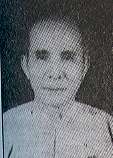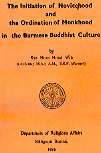
CODE OF DISCIPLINE
OF THE BUDDHIST MONK
( The Pitimokkha of the Bhikkhus)
Sao Htun Hmat Win, MA., AM.
(Adviser to the Ministry of Religious Affairs),Yangon,
Myanmar

|
CODE OF DISCIPLINE
OF THE BUDDHIST MONK
|
 |
| I. INTERROGATORIES
|
Reverence to the Glorious One, the Almighty One, the Enlightened Buddha. There are four preliminary obligations which must be met prior to the performance of the Sabbath rites. —Shall sweep clean the Chapel House (Sammajjani) —Shall light the oil lamps and candle sticks to dispel the darkness in the Chapel House (Padipo.) —Shall place water pots in the Chapel House to quench the thirst and to clean face, hands and feet (Udakam) —Shall arrange the seats in proper order within the Chapel House (Asana) These four obligations are known as Pubbakarana. And again there are five preliminary functions which ought to bo done prior to the commencement of the Sabbath rituals. —The consent of the absent monks must be reported to the Assembly by the advocate monks. (Chanda) —The confession of purity and innocence of the absent monks must be reported to the Assembly by the advocate monks (Parisuddhi) —The date of the Sabbath Day at present must be informed to the Assembly (Utukkhana) —The number of attendants at the Assembly must be counted and reported to the Assembly (Bhikkhu ganana) —The Chairman of the Assembly must nominate an Instructor monk to admonish the nuns (Bhikkhuni) at the convents (Bhikkhunt ovada) These five preliminary functions are known as Pubbakicca The Assembly to perform the Sabbath Rites must be endowed with the four eligible articles: - Sabbath day must fall either on the Fourteenth or Fifteenth Waxing Day or on the fifteenth Waning Day (Fullmoon) of the lunar month (Catuddasi or Pannarasi Uposatha) —The quorum of the Assembly must be not less than four fullfiedged bhikkhu monks (Bhikkhu Kammapatta) —All the participant monks must be free from common sin (Nasabhdga apattiyo) —Novices, nuns, laity, animals, birds and all, other than the bhikkhu monks must not be present there within the inner Circle of the Chapel Hall. They must stay about an arnilength away ( 2 1/2 cubits) from the Assembly of monks. (Vajjaniya puggala na honti) This eligible and appropriate Assembly is known as Pattakalla. Having met these essential preliminary obliga tions and preliminary functions, the Assembly of bhikkhu monks purify themselves in confession, and unanimously assign the duty of recitation of the Patimokkha Disciplinary Code upon a particular scholarly monk. |
II. INTRODUCTION |
| Reverend Sirs, may the Assembly harken to my words. Today is the Sabbath Day on the Fifteenth of the lunar month. If it is convenient and appropriate to the Assembly, the Assembly may observe the Sabbath and may propound the Patimokkha Disciplinary Code. Has the preliminary function been carried out by the Assembly? Did your Venerables confess your purity according to the disciplinary moral code? I am going to propound the Patimokkha Disciplinary Code. Let us listen respectfully and introspect · carefully on all these rules. The monk who has committed a sin, should declare it immediately. If you have done nothing wrong, you may remain silent. If all of your Venerables remain silent, then I shall account that you are innocent and pure at heart. This means I am asking you each and every one, individually. Thus do I announce three times in this way to the Assembly. In spite of three times of announcement, if a certain monk does not reveal the sin he has committed, which is still fresh in his memory, he is guilty of the Latent Lie - Sampajna Musavada. This offence of the Latent Lie is censured by the Blessed One as an obstacle in the path to Nibbana. Therefore if the monk remembers his guilty offence and wishes to purify himself, he should declare his apparant offence here and now. He will be relieved and his conscience will be clear and be at ease if he does so. This introduction is propounded to your Venerables Sirs, I ask the first time; and the second time I ask; and the third time I ask if your Venerables are all innocent and clean from all sins. Because your Venerables are all innocent and clean from all sins, therefore you all remain in silence. We assume that you are all clean and innocent, Sirs. This is the chapter of Introduction in the Patimokkha Disciplinary Code. Venerable Sirs, the Introduction has been recited. Herein I ask the venerable ones: Are you pure in this? For the second time I ask the venerable ones: Are you pure in this? For the third time I ask the venerable ones: Are you pure in this? The venerable ones are pure herein; that is why they are silent. So do I recod it. Nidanuddeso pathamo End of First Section on Introduction |
| III. PARAJIKA DHAMMA
|
These four Offences which entail loss of monk-hood come up here for recitation. 1. A monk who, undertaking the Rules of Discipline and not having disavowed his Training and not having declared his unwillingness to stay as a Bhikkhu, indulges in any kind of sexual intercourse commits an offence entailing loss of monkhood and he is not to be associated with. 2. A monk who either in a village or elsewhere in the forest takes with the intention of stealing what has not been given to him, where the theft is such that rulers, catching a thief, would flog him or imprison him or banish him, saying 'You are a robber, you are wicked, you are stupid, you are a thief,' commits an offence entailing loss of monkhood and he is not to be associated with. 3. A monk who intentionally deprives a human being of his life or provides the means for suicide or praises death, or incites him to commit suicide saying 'Of what use to you is this evil difficult life? Death is better for you than life' thus having his mind set on the other's death and with the idea that he should die, praises death in various ways or incites him to commit suicide, commits an offence entailing loss of monkhood and he is not to be associated with. 4. A monk who boasts, with reference to him self, of clear superhuman knowledge and divine insight which are preventive or destructive of Kilesas (Defilements) and which are the attributes of those who have attained Jhana, Magga and Phala, without having such superhuman knowledge or divine insight, as well as a monk who having been guilty of contravention of this rule (and having lost his monkhood) and being desirous of the clean status of a novice or a layman, confesses subsequently, on being examined or without being examined: Sir, I said "I know", without really knowing and "1 see" without really seeing. I have made an empty boast and told a lie', commits an offence entailing loss of monkhood and he is not to be associated with, provided that he was not under an ambitious delusion. (adhimana) Venerable Sirs, the Four Cases of Defeat Parajika dhamma) have been recited, in any one of which if a bhikkhu admits to be at fault he is no longer entitled to (live in) communion with bhikkhus; as (he was) before (the admission) so he is after (the confession of the fault); he is defeated and no more in communion. Herein I ask the venerable ones: Are you pure in this? For the second time I ask the venerable ones: Are you pure in this? For the third time I ask the venerable ones: Are you pure in this? The venerable ones are pure herein; that is why they are silent. So do I record it. Parajikuddeso Dutiyo End of Second Section on Parajika. (To be continued) |
This page at Nibbana.com was last modified: